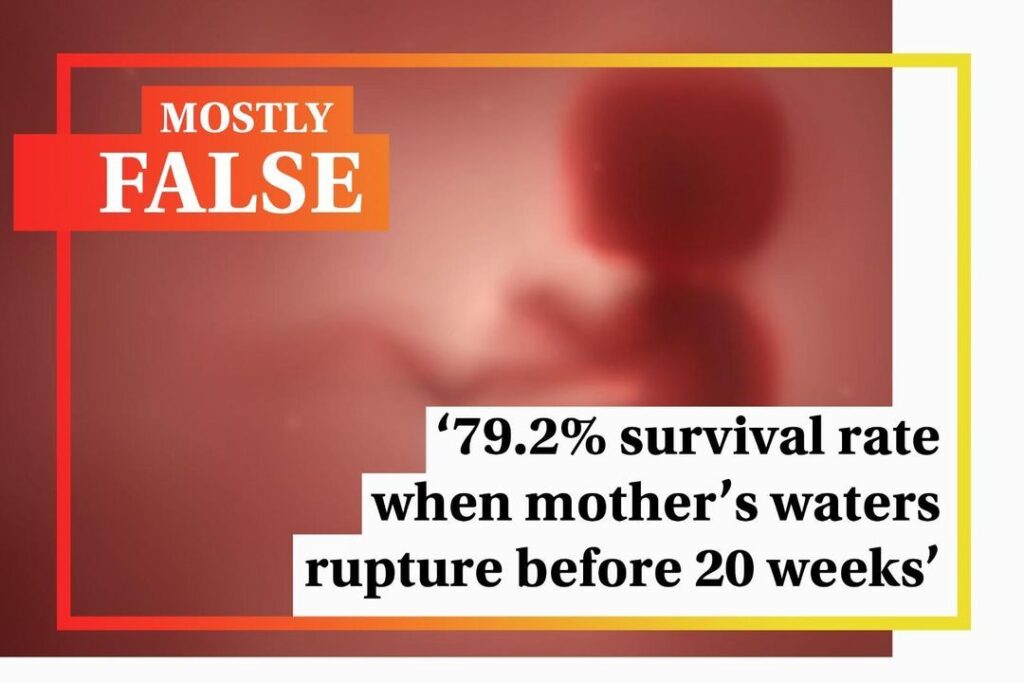The case involving a pregnant US woman denied a termination at Mater Dei hospital last year has raised the issue of the chances of survival of an unborn baby when the mother’s waters break in early pregnancy.
Testifying in court last week, consultant head of obstetrics and gynaecology at Mater Dei, Yves Muscat Baron stated that following developments over the past decades, there is now a 79.2% survival rate of the unborn baby when the mother’s waters rupture before 20 weeks.
Muscat Baron was testifying in constitutional proceedings related to Andrea Prudente, who suffered a ruptured membrane when she was 16 weeks pregnant.
What was the impact of the claim?
Reacting, advocacy group Doctors for Choice issued a statement arguing that this claim is based on a 2022 study which actually shows a different outcome.
The court testimony was also referenced in a press release issued by another advocacy group, Doctors for Life, which stated “the most recent study on the subject suggests that such babies may have a nearly 80% chance of survival in such circumstances”.
Columnists Ranier Fsadni and Fr Joe Borg also referenced the testimony in opinion pieces published by Times of Malta.
Where does the claim come from?
We asked Muscat Baron whether his court testimony was referring to the 2022 study cited by Doctors for Choice. He directed Times of Malta to the Health Ministry which, in turn, declined to comment, arguing that doing so might prejudice an ongoing court case.
Since both Muscat Baron and the Health Ministry declined to comment, we are unable to verify that the statement made by Muscat Baron in court was based on that study, nor can we categorically exclude the existence of a different study supporting his statement.
Nonetheless, this appears to be unlikely.
A review of other studies on the topic did not find any other research citing a survival rate of 79.2% in similar cases.
Furthermore, the authors of the study in question state that their “results differ from other studies that reported ranges of survival rates… from as low as 24% to as high as 70%”, suggesting that the authors themselves are not aware of any other study citing the 79.2% figure.
What does the study explore?
In order to determine whether this study truly claims that an unborn baby has a 79.2% survival rate when the mother’s waters rupture before 20 weeks pregnancy, we need to delve into it in some detail.
The study, carried out by a group of Israeli researchers, explores the survival rates of infants born to mothers who had experienced preterm premature rupture of membranes (PPROM) between 17 and 33 weeks of gestation.
PPROM is a condition in which the amniotic sac surrounding the foetus breaks before week 37 of pregnancy, increasing the risk of infection for the mother.
The study is an observational retrospective cohort study. That means it is a type of study which looks into past data and divides cases into two or more separate groups, each having different degrees of exposure to the topic under study, in order to compare outcomes between the groups.
In this particular study, cases were divided into three groups:
- group one experienced PPROM between weeks 17 and 23,
- group two was affected by PPROM between weeks 24 and 27,
- and group three experienced it at weeks 28 to 33.
The paper explores cases of PPROM at periviable gestational age, which is the earliest stage of foetal maturity during which the foetus may have a marginal chance of survival outside the womb. The authors define this as broadly between 20 and 25 weeks, although other studies often describe this as between 22 and 26 weeks of gestation.
The study does not explore the survival rate of infants born in cases where PPROM occurs before 17 weeks of gestation.
What does the study find?
In their paper, the researchers find that “the survival rate to discharge in neonates born to prolonged PPROM-complicated pregnancy at GW (gestation week) <24 is 79.2%”.
This suggests that the survival rate of 79.2% is attributed to all observed cases of PPROM between 17 and 23 weeks, not simply those under 20 weeks, as claimed. The authors go on to say that “the infants who did not survive were from a lower GW at the time of PPROM”, indicating that the survival rate decreased the earlier the PPROM occurred.
A closer look at the data presented by the researchers within the study reveals that in the cases under review where PPROM took place between weeks 17 and 23, a total of 19 infants survived and five died. The 19 infants who survived were all from instances where PPROM occurred between weeks 19 and 23, whilst none survived between weeks 17 to 18.
The median age of the 19 surviving infants was 22 weeks, indicating that the majority were in weeks 22 and 23.
On the other hand, the five infants who died spanned from cases of PPROM between weeks 17 and 22. This suggests that all observed cases before week 19 resulted in the infant not surviving.
Verdict
Although the study does find a survival rate of 79.2% for infants born in cases of PPROM before 24 weeks of gestation, the study does not make this claim for cases specifically before 20 weeks. A closer look at the data reveals that while the study does find cases of survival at 19 weeks, this was a minority finding. None of the observed cases at 17 or 18 weeks survived.
This claim is therefore mostly false because the evidence generally refutes the claim, although some minor aspects may be accurate.
The Times of Malta fact-checking service forms part of the Mediterranean Digital Media Observatory (MedDMO) and the European Digital Media Observatory (EDMO), an independent observatory with hubs across all 27 EU member states that is funded by the EU’s Digital Europe programme. Fact-checks are based on our code of principles.
Let us know what you would like us to fact-check, understand our ratings system or see our answers to Frequently Asked Questions about the service.





